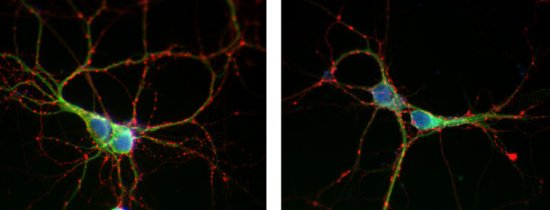You Are What You Eat AND Drink.

You Are What You Eat AND Drink:
New Research Focuses on Alcohol and Nutrition
…

- These images compare the synapse formation (appearsin red) in the neurons from two mouse fetuses. The one on the left is from the fetus that had sufficient DHA during gestation while the one on the right is from the fetus that did not. The neurons derived from the DHA-deficient mouse fetus show 50 percent fewer synapses. The inhibited synapse formation due to DHA-deficiency may have significant implication in developing depression and alcohol dependence. Photo courtesy of Dr. Hee-Yong Kim, NIAAA intramural program (Journal of Neurochemistry. 2009 Oct;111(2):510-21).

…
More and more researchers are investigating how alcohol and nutrition interact to impact our biology, our behavior, and our health. In addition to dependence, alcohol can trigger a host of health problems, including certain cancers, cardiovascular disease, liver disease, and fetal alcohol syndrome. Researchers are interested in what role nutrition can play in preventing and treating these alcohol-related health outcomes.
“When you think about alcohol as part of your overall diet—a food like any other that you consume with other foods, it leads to lots of questions—like does alcohol consumption change food intake, does food intake change alcohol intake, and how do various patterns of alcohol and food consumption together influence the risk of chronic disease?” said Dr. Rosalind Breslow, an epidemiologist in NIAAA’s Division of Epidemiology and Prevention Research.
Dr. Breslow recently collaborated with researchers at the National Cancer Institute (NCI) and the U.S. Department of Agriculture (USDA) to investigate some of the connections between alcohol and diet. She led a team that analyzed data collected from participants in the National Health and Nutrition Examination Survey (NHANES) and from scores on the Healthy Eating Index-2005 (HEI). NHANES is a survey of nationally representative samples of the U.S. population that the U.S. Department of Health and Human Services’ Centers for Disease Control and Prevention conducts on an ongoing basis. The USDA created HEI to measure how healthy our diets are based on how closely they conform to the 2005 U.S. Dietary Guidelines for Americans.
Dr. Breslow and her team found that heavier drinkers tend to eat less fruit and consume more calories from a combination of alcoholic beverages and foods high in unhealthy fats and added sugars. Men in particular who consumed a lot of calories from alcohol also ate less whole grains, an important source of dietary fiber, and less low-fat dairy products, including milk, yogurt, cheese, and soy beverages, important sources of calcium and other nutrients. Women who drank too much also had lower HEI-2005 scores.
Overall, the researchers found that as a study participant’s average daily number of drinks went up, their HEI-2005 score went down. This may be one reason why heavy drinkers are more susceptible to alcohol’s negative health effects, including certain cancers, liver cirrhosis, and heart disease.
People who drink more also consume less omega-3 fatty acids, which are fats that help compose our brain and are critical for brain function. These fats are found in fish like salmon, sardines, and tuna. What’s more, alcohol actively depletes omega-3s from the brain.
“We can only get omega-3 fatty acids through our diets. Alcoholics have very little omega-3s going in and a lot of them going out,” said Joseph Hibbeln, M.D., a psychiatrist and acting chief, Section on Nutritional Neurosciences at NIAAA and captain, U.S. Public Health Service.
Alcohol can deplete one particular type of omega-3 fatty acid in the brain, docosahexaenoic acid, or DHA, by half.
Dr. Hibbeln’s research is moving toward understanding the consequences of this DHA deficiency for everyone, including alcoholics. For example, low DHA levels can result in depression, aggression, and impulsivity. As Hibbeln stated, “My more than 20 years of research indicates that people who eat little fish are at much greater risk of depression.”
A lack of DHA in the brain can also run down dopamine levels. “It is well known that chronic addicted states are characterized by dopamine depletion,” explained Hibbeln. Diets deficient in omega-3s can lower dopamine levels by half. A recent study introduced mice with a diet low in omega-3s to low levels of amphetamines. The mice released dopamine at levels similar to a chronically addicted animal. Hibbeln attributes this dopamine deficiency to their “bad diet.”
Insufficient omega-3s can also link directly to a cycle of addiction. Too little omega-3s, coupled with too many omega-6 fatty acids, which are fats in abundance in the typical American diet, can lead to excess food intake, excess alcohol intake, and an inability to feel satiated. This imbalance increases the craving for alcohol, and causes those who are susceptible to drink too much.
One recent study illustrates the potential for positively impacting alcohol dependence by increasing omega-3s in the diet.
Dr. Hibbeln offered 2 grams of omega-3s to 96 alcoholics in early recovery. He verified that participants were taking the omega-3s by measuring the levels of fatty acids in their spinal fluid. Over the 90 days of the study, alcoholics who took omega-3s had an average of about 3.2 drinking days compared to the 17.5 drinking days in the placebo group.
“This study of 96 alcoholics provides promising pilot data for potential benefits of ensuring adequate brain nutrition among alcoholics in recovery,” Hibbeln said.
Hibbeln plans to focus future studies on evaluating whether these results can be replicated.
Hibbeln’s and Breslow’s work are just two examples of the research investigating the connections between alcohol and nutrition.
As Breslow said, “It’s a very exciting area, with implications for both public health and basic research.”
______________________________________________
* NIAAA Spectrum, Vol. 2, Issue 3, September 2010.
** The above story is reprinted from materials provided by National Institute on Alcohol Abuse and Alcoholism


















